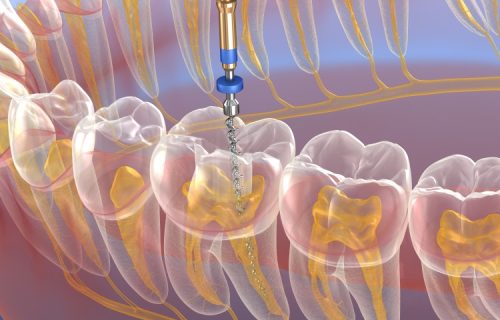Root Canal Instruction

Root Canal
A root canal is a common dental procedure that is done to save a badly damaged or decayed tooth. It’s a good way to keep your natural teeth and avoid getting them pulled. Here are some things you can do to get ready for and heal from a root canal if your dentist has suggested it.
Be ready to move.
Before doing a root canal, your dentist will check your teeth and gums carefully to find out how bad the infection or damage is. X-rays may also be used to get a better look at the roots of the affected tooth.
To make sure your dental procedure goes well, you should do what your dentist tells you to do to get ready. This could mean that you have to fast before your treatment and take the medicines as directed.
With the Plan of Action
During root canal surgery, our dentist will remove the infected or hurt pulp from inside your tooth. Next, the root canals will be cleaned and made to fit the teeth. Then, they will be filled with a special material to stop the infection from spreading. In the end, the tooth will be protected by a filling or a crown.
Even though the surgery is usually done with a local anaesthetic, you shouldn’t feel any pain. It’s important to tell the dentist if you feel any pain during the procedure so that they can adjust your anaesthesia or give you more painkillers if needed.
After a root canal, your mouth might feel numb for a while. Don’t eat or drink anything until the numbness has worn off, because you could burn or cut your mouth if you do.
It’s common for the tooth to hurt or feel sensitive in the days after dental surgery. In these situations, it is common to take over-the-counter or prescribed painkillers to feel better.
Also, you shouldn’t bite down on the broken tooth until a filling or a crown is put on it. This will help keep your health from getting worse in the future.
On the day of your root canal, your dentist will numb the area around the affected tooth with a local anaesthetic. They will drill a small hole in the crown of your tooth and use sophisticated tools to pull out the damaged pulp and nerve tissue through the hole.
Once the diseased or damaged tissue is removed, your dentist will clean and sanitise the area before filling it with a special dental material. Temporary fillings are used to protect the tooth until the crown is ready.
In the days after you get a root canal, it is normal to feel some pain or sensitivity in your tooth. Your dentist may suggest over-the-counter pain relievers or give you a prescription for stronger medicine to help with any pain.
It is important to do what the dentist tells you to do after the procedure. This may include not eating or doing certain things and keeping the area around the impacted tooth clean. And don’t forget that you must go to all of your follow-up appointments to make sure your tooth is healing properly.
After a root canal is done, a crown is often put on the tooth to protect it from more damage. This will help keep the tooth healthy and get it working again.
If your dentist told you that you need a root canal, you don’t need to worry. Root canal therapy is a common way to save teeth that have been badly damaged or decayed.
When the pulp of a tooth gets infected or swollen, it can cause unbearable pain and needs to be treated by an endodontist. Most patients say that their treatment went well because of modern techniques and anesthetic’s.
If you had pain or an infection in the tooth before treatment, it may be very sensitive for a day or two afterward. You can get medicine to help with this pain either over-the-counter or from a doctor. Do everything your endodontist tells you to do.
After an endodontic procedure, your tooth may still feel a little different from the rest of your teeth for a while. An endodontist should be seen if you have extreme pain, pressure, or discomfort that lasts for more than a few days.
How many appointments do I need to get a root canal done?
Most of the time, a root canal can be done in one or two appointments. On the first appointment, we will actually remove the infected pulp by doing surgery. After the second (and maybe even the third) appointment, the root canal is cleaned and filled with a crown or another filling to stop infections from happening again. A consultation usually lasts for 90 minutes.
Follow our dentist’s instructions before, during, and after a root canal to make sure the procedure goes well and your tooth stays healthy for years to come. If you have questions or concerns about root canals, you should talk to your dentist.
Sustaining Proper Oral Hygiene
After a root canal, it’s important to take care of your teeth so you don’t get an infection or hurt the tooth further. During the first few days after treatment, you can brush and floss your teeth as usual, including the tooth that was treated.
Our dentist may also tell you to use an antiseptic mouthwash to get rid of any bacteria that might still be there. After a root canal, you’ll have a follow-up appointment with your dentist to talk about how you’re feeling and make sure the tooth is healing properly. They might take more x-rays to look at the pulp chamber and the bone around it.
Please call your dentist right away if you have any strange or bad effects after surgery, such as severe pain or swelling. It’s possible that they’ll need to change your treatment plan or give you more drugs to help you deal with your symptoms.
Conclusion
Root canal treatment can save a badly decayed or broken tooth from having to be taken out. By carefully following your dentist’s instructions and taking care of your teeth on a regular basis, you can speed up your recovery and keep your natural smile for a long time. Talk to your dentist if you have any questions or worries about getting a root canal. Your oral health depends on the choices you make, and they can give you the information and advice you need to make those choices.
Instruction
DO NOT eat or drink anything for the next half hour. DO NOT try to feel around your tooth with your tongue.
You need to have a crown placed on your tooth within 1 MONTH of the root canal being completed. If this is not done, the tooth is very likely to fracture or to develop new decay underneath the filling, which may cause your root canal to fail.
DO NOT use the tooth to bite down on anything hard (peanuts, pretzels, ice, etc.) until the permanent filling/crown has been placed on the tooth. Again, the tooth is prone to fracture and if you bite down on anything too hard or crunchy you may crack the tooth.
Some minor discomfort in the area is normal during and following the root canal. It is normal for the tooth to be uncomfortable for 2-3 days after today’s treatment. Sometimes, depending on the circumstances, the tooth and surrounding tissues may remain sore for a few weeks post treatment
All of the above scenarios should be handled with the prescription of medicines given to you. 90% of the time this is enough to handle the discomfort. If it is not, please contact our office and we will ensure you are comfortable.
You may floss and brush your tooth as normal.



